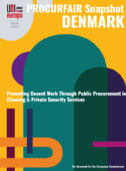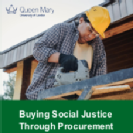IER News & blogs
Public procurement as a policy tool
Building on extensive work on sustainable public procurement over the past years, IER's Dr Eva Katharina Sarter presented a paper entitled "Hidden Debates: Public Procurement as a Venue for Negotiation", which examined the political dimension of debates on the strategic use of public procurement to foster (social) policy goals.
Public procurement and labour market inequality - a multi-faceted relationship
 Over the past decades, public procurement has gained importance as a policy tool, also in the context of labour market and employment policies. Among others, public procurement is used as a lever to shape wages and working conditions, foster equality, and create jobs and training opportunities.
Over the past decades, public procurement has gained importance as a policy tool, also in the context of labour market and employment policies. Among others, public procurement is used as a lever to shape wages and working conditions, foster equality, and create jobs and training opportunities.
Promoting decent work through public procurement in cleaning and private security services - country report Denmark
 Buying decent work has attracted increased political and academic attention in Denmark, where especially trade unions and centre-left political parties have pushed the agenda for applying labour clauses in public procurement as well as ensure their enforcement. All Danish regional authorities and nine out of ten Danish municipalities apply labour clauses in some of their publicly procured work.
Buying decent work has attracted increased political and academic attention in Denmark, where especially trade unions and centre-left political parties have pushed the agenda for applying labour clauses in public procurement as well as ensure their enforcement. All Danish regional authorities and nine out of ten Danish municipalities apply labour clauses in some of their publicly procured work.
Leveraging procurement to foster employment equality
 The ESRC funded Buying Social Justice through Procurement project of which Dr E.K. Sarter is a Co-Investigator published its final report. Based on mixed-method research, the report sheds light on the policy framework and the inclusion of equality objectives in public procurement in England, Scotland and Wales and identifies barriers to and enablers of socially responsible public procurement.
The ESRC funded Buying Social Justice through Procurement project of which Dr E.K. Sarter is a Co-Investigator published its final report. Based on mixed-method research, the report sheds light on the policy framework and the inclusion of equality objectives in public procurement in England, Scotland and Wales and identifies barriers to and enablers of socially responsible public procurement.
Equality and diversity toolkit welcomed by speakers at launch event
 The Buying Social Justice project, which comprises Prof Tessa Wright, Prof Hazel Conley, Dr Joyce Mamode and IER’s Dr Katharina Sarter, launched its toolkit for practitioners on including equality and diversity objectives within public procurement at a well-attended online event on 19 October 2023. At the event, the project team presented key findings from the two-year research project, which have fed into the guidance and good practice examples in the toolkit.
The Buying Social Justice project, which comprises Prof Tessa Wright, Prof Hazel Conley, Dr Joyce Mamode and IER’s Dr Katharina Sarter, launched its toolkit for practitioners on including equality and diversity objectives within public procurement at a well-attended online event on 19 October 2023. At the event, the project team presented key findings from the two-year research project, which have fed into the guidance and good practice examples in the toolkit.
The recording of the session is now available on the project website. The equality and diversity toolkit is available for download from this project website.
